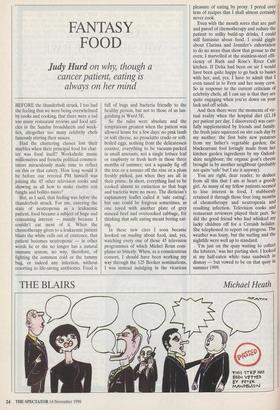FANTASY FOOD
Judy Hurd on why, though a cancer patient, eating is always on her mind
BEFORE the thunderbolt struck, I too had the feeling that we were being overwhelmed by cooks and cooking, that there were a tad too many restaurant reviews and food arti- cles in the Sunday broadsheets and week- lies, altogether too many celebrity chefs famously stirring their sauces.
Had the chattering classes lost their marbles when their principal food for chat- ter was food itself? Workaholic music millionaires and frenetic political commen- tators miraculously made time to reflect on this or that eatery. How long would it be before our revered PM himself was joining the 45 other television cooks and showing us all how to make risotto con funghi and bollito misto?
But, as I said, that feeling was before the thunderbolt struck. For me, entering the state of neutropenia as a leukaemic patient, food became a subject of huge and consuming interest — mainly because I couldn't eat most of it. When the chemotherapy given to a leukaemic patient blasts the white cells out of existence, that patient becomes neutropenic — in other words he or she no longer has a natural immune system; no way, therefore, of fighting the common cold or the tummy bug, or indeed any infection, without resorting to life-saving antibiotics. Food is full of bugs and bacteria friendly to the healthy person, but not to those of us lan- guishing in Ward 5E.
So the rules were absolute and the temptations greatest when the patient was allowed home for a few days: no pink lamb or soft cheese, no prosciutto crudo or soft- boiled eggs, nothing from the delicatessen counter, everything to be vacuum-packed in small amounts, not a single lettuce leaf or raspberry or fresh herb in those three months of summer, not a squashy fig off the tree or a tomato off the vine or a plum freshly picked, just when they are all in their prime. In short, everything had to be cooked almost to extinction so that bugs and bacteria were no more. The dietician's explanatory leaflet called it 'safe eating', but one could be forgiven sometimes, as one toyed with another plate of grey minced beef and overcooked cabbage, for thinking that safe eating meant boring eat- ing.
In these new circs I soon became hooked on reading about food, and, yes, watching every one of those 45 television programmes of which Michel Roux com- plains so bitterly. When, as a conscientious consort, I should have been working my way through the 125 Booker nominations, I was instead indulging in the vicarious pleasure of eating by proxy. I pored over tens of recipes that I shall almost certainly never cook.
Even with the mouth sores that are part and parcel of chemotherapy and reduce the patient to milky build-up drinks, I could still fantasise about food. I could giggle about Clarissa and Jennifer's exhortation to do no more than show that grouse to the oven; I marvelled at the stainless-steel effi- ciency of Ruth and Rose's River Café kitchen. If Delia had been on air I would have been quite happy to go back to basics with her, and, yes, I have to admit that I even tuned in to Fern and her noisy crew. So in response to the current criticism of celebrity chefs, all I can say is that they are quite engaging when you're down on your luck and off solids.
And then there were the moments of vir- tual reality when the hospital diet (£1.18 per patient per day, I discovered) was care- fully supplemented by friends and family: the fresh juice squeezed on site each day by my mother; the first baby new potatoes from my father's vegetable garden; the blackcurrant fool lovingly made from her kitchen garden ingredients by my Oxford- shire neighbour; the organic goat's cheese brought in by another neighbour (probably not quite 'safe' but I ate it anyway). You are right, dear reader, to deduce from all this that I am at heart a greedy girl. As many of my fellow patients seemed to lose interest in food, I stubbornly retained it through those four long months of chemotherapy and neutropenia and resulting infection. Television cooks and restaurant reviewers played their part. So did the good friend who had whisked my lucky children off for a Cornish holiday. She telephoned to report on progress. The weather was lousy, but the surfing and the nightlife were well up to standard. `I'm just on the quay waiting to collect the lobsters,' was her parting shot. I looked at my half-eaten white tuna sandwich In dismay — but vowed to be on that quay in summer 1999.


















































































 Previous page
Previous page